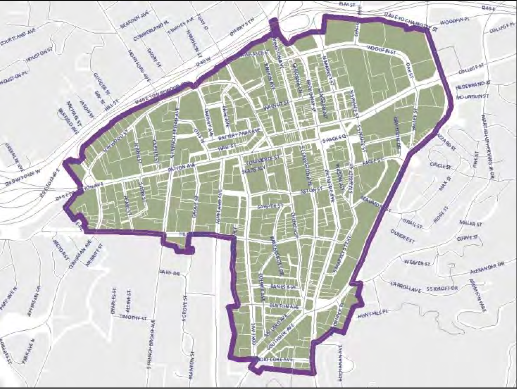The revised boundary of the proposed BID
The Interim BID Board has released its revised proposal for a Business Improvement District in downtown Asheville. The new proposal shortens the borders of the district, delays the controversial ambassador safety program, and changes the composition of the governing board, as well as opening the possibility of a lower tax to fund the district.
The original BID proposal — for an independent non-profit funded by a special tax district — came before Asheville City Council in June, the subject of a fierce debate. BID advocates portrayed it as necessary to ensure downtown’s prosperity and better services. BID opponents, comprising everyone from some business owners to local activists, asserted that it will impose an unnecessary burden while giving power to an unelected board and trampling on downtown’s culture.
Council delayed a decision on the BID, citing concerns over the governing board, finances, and its potential role.
The new BID proposal shortens the district’s boundary, excluding the part of the Central Business District east of Charlotte Street. A proposed “ambassador” program, with uniformed volunteers assisting visitors and deterring “undesirable behavior,” will be delayed until the second year of the BID, with its approval contingent upon review by a special committee open to community members. Instead, the BID will initially focus on street cleaning, snow removal, landscaping, graffiti removal and other clean-up services.
The new proposal also offers the possibility of a lower tax rate than originally proposed to fund the district, noting that “the decision to raise taxes is not a light one and the Interim Board has explored lower rates than 7 cents per $100 of taxable value [what the original proposal called for]. Taking into account estimated budget, the Interim Board believes that the objectives can be met with a rate between 5 and 7 cents per $100, depending on local government participation.”
The composition of the proposed board has also changed, expanding to 15-19 members. It now calls for a minimum of three major ($3 million or more) property owners, three small/medium property owners (under $3 million), two residents, two office tenants, two business owners, two at-large members, and representatives from Council, the Buncombe County Board of Commissioners, the Downtown Association and the Downtown Commission. Council would appoint the initial board members, and future ones would go through a nominating committee.
However, while the board is larger, it is still selected by existing board members, rather than elected or appointed by the city. Some on Council, including BID supporter Marc Hunt, noted that they wanted the city to appoint the board to ensure greater transparency. The new proposal asserts that “The Interim Board has spent the summer speaking with, and in some cases visiting with, BID boards and directors across the state. None of the NC BIDs we used for comparison had elected or appointed boards.”
Council will vote on the new BID proposal at its Oct. 9 meeting.




No. No. No. This does not improve anything; it’s still a terrible idea.
There is so much that could go wrong with this: “A proposed “ambassador” program, with uniformed volunteers assisting visitors and deterring “undesirable behavior,” will be delayed until the second year of the BID, with its approval contingent upon review by a special committee open to community members.”
Who determines what is undesirable behavior?
A “special committee open to community members”. “Open” to them may mean that community members are invited (or not) but not listened to. This whole proposal reeks. Our city center should not be managed/controlled by a completely undemocratic body with no accountable agenda.
‘…with uniformed volunteers…deterring
“undesirable behavior,” will be delayed…’
Without snitches, how will we target the panhandlers (and hopefully, the less talented buskers)?